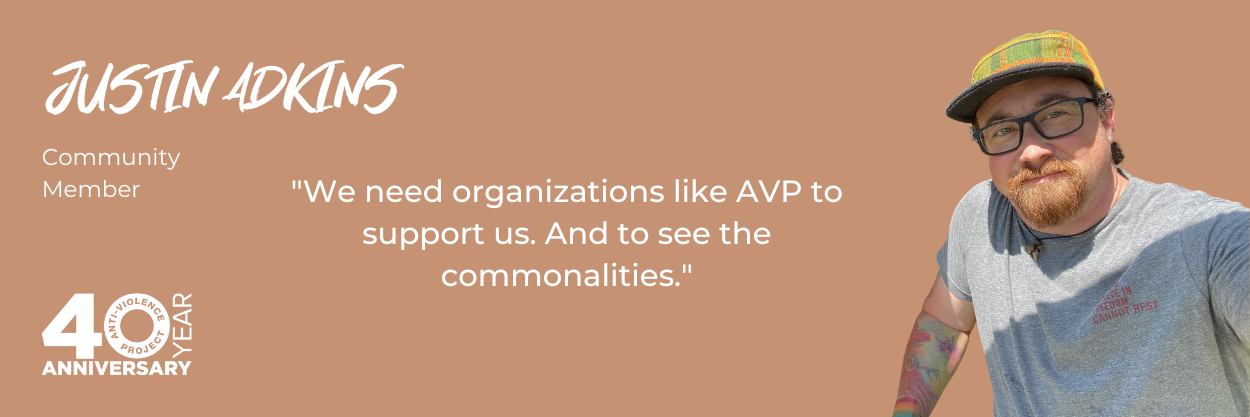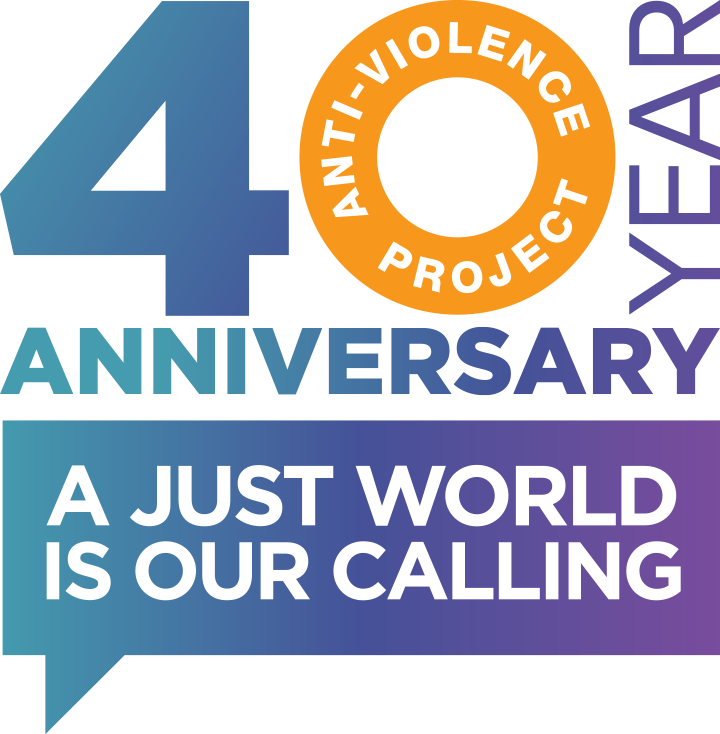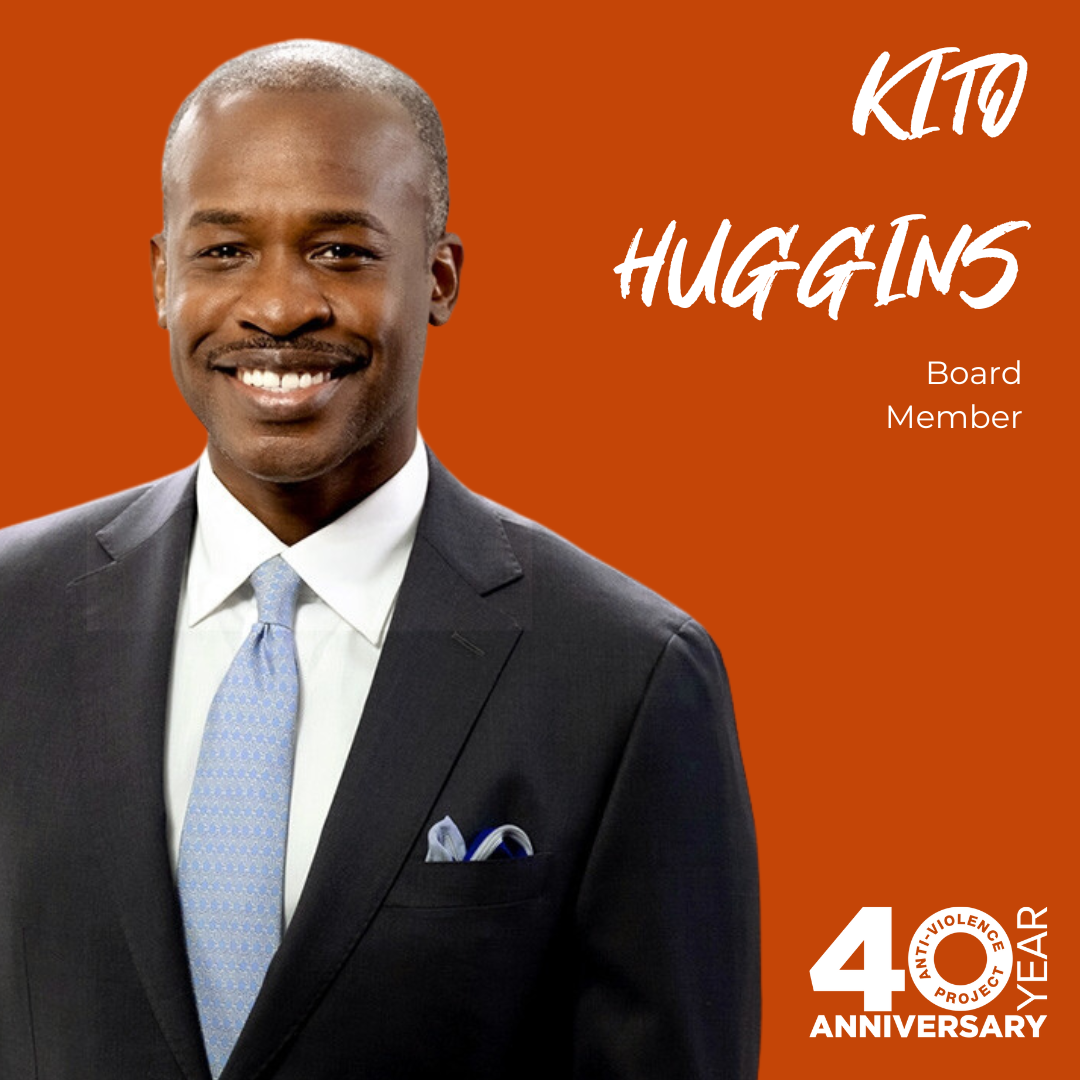
This interview has been shortened and condensed for clarity.
After his arrest during Occupy Wall Street in 2011, justin adkins found AVP to help with his lawsuit against the City in an effort to combat transphobia. Teaming up with AVP gave justin a chance to take on unjust practices within the criminal legal system.
“I’m a white trans guy, and I’m very aware of those privileges…. I pursued [these cases] because I had the privilege to do so. And they set precedent that has … supported mostly trans women of color, who are the ones who predominantly are arrested and mistreated by the police, not just in New York City, but across the country.”
We discussed justin’s journey from Occupy to current day. Read on to hear his story.
Can you walk me through your arrest during Occupy?
On October 1, 2011, I was on the Brooklyn Bridge with 700 other people. And we were all arrested for occupying the Brooklyn Bridge.
We all had the assumption that we’d probably be fully processed and end up staying at least overnight in jail. I mentioned to the legal aid person that I was trans because at that time, there had been quite a few assaults of trans people in detention in New York. And I knew that this is something legal aid would want to know and they did, really to make sure that they knew where I was [being held] as a trans person. One of the arresting officers overheard me.
From that point, they treated me differently because I was trans. So a whole bus load of us ended up at a precinct in Brooklyn. And for the first five seconds I was put in a cell with other men who had been arrested with me that day. Within a few minutes, they came to the cell and I knew, I actually already knew that it was for me, and they pulled me [out of the cell]. They chained me to a railing next to the only working restroom in the precinct.
That whole night, it was just a parade of people coming to use the restroom next to me. All the other people I had been arrested with were given sandwiches and stuff. I was not given anything. They made fun of me throughout the night. And when I was released around 1:00 AM legal aid was waiting for all of us. They were especially waiting for me. So I had made the right decision, even though I encountered discrimination because of it.
I’m friends with different trans lawyers who advocate for trans people. And so I contacted some of my friends. It wasn’t a case that was rising to anybody’s interest, but everybody told me to get in touch with AVP. And so I did and Ejeris Dixon was the person I worked with and she’s amazing. We’ve remained friends to this day. Some of my friends helped me craft a statement that then AVP released about my arrest. From there, people at Occupy Wall Street were upset with me because they’re like, ”This isn’t about trans issues.” I’m like, “There’s nothing more about trans issues than thinking about the economy.”
I’m a privileged trans person who is gainfully employed, whose employer was okay with me being public that I was there, that I had been arrested. I had a lot of support that other trans people don’t have. And then through that, I ended up getting connected with Andrea Ritchie who was then my lawyer.
Then when Andrea Ritchie helped me sue the city, we settled. And part of that settlement was a federal agreement, was case law federally for trans people. So from that, my case is being used for a lot of other cases to support trans people, not just in regards to being detained. And it did change policy for the NYPD as well.
Can you walk me through the court proceeding?
So there were two parts of me being in court. The first part was support from the Legal Guild, who was amazing in my case with the city, pursuing a case against me for being on the Brooklyn Bridge.
And my case against the city with the support of Andrea Ritchie, who was amazing. And between her and AVP handling a lot of the messaging, So it was a really wild ride of me doing interviews. AVP helped me prep for all of that. For a lot of people, that part of the process of doing interviews and stuff is where things then go awry for their court cases. And it was really with the support, especially of Ejeris with the whole AVP team that helped me stay on point from day one. They really helped me craft a list of talking points that to this day I use.
I’m a white trans guy, and I’m very aware of those privileges. But I pursued [these cases] because I had the privilege to do so. And they set a precedent that has thus supported mostly trans women of color, who are the ones who predominantly are arrested, and mistreated by the police, not just in New York City, but across the country.
What have you taken from this experience with AVP and with the legal system?
So a few things, I mean, one is just that I live in a very rural community. And I did then, and I have ever since, but I have a lot of friends in the city. When things have come up, I’ve really encouraged them to reach out to AVP for support. And they’ve gotten the same level of amazing support that I received.
People reach out to me. I worked at higher education until last year and some of my former students have gone on to law school and they’ve contacted me. They’ve been like, “Oh my God, Justin, I was in class in law school and your case came up.”
I have a Google alert on my name and every once in a while, cases come up that use my case as precedent. And it means a lot. And judges have to look at that. And that’s just, it’s just been amazing. And that’s the work of everybody teaming together.
Why do you think AVP and organizations like it are necessary?
We need organizations like AVP to support us. And to see the commonalities. That’s one of the things that happened for me is that AVP could see that what I was saying and what happened to me had a commonality [with] what all these trans women of color had been saying for years. We all need to work together toward justice.




